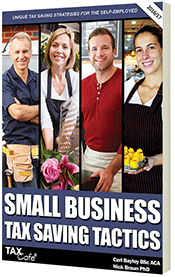Declaring New Sources of Business Income
When to declare new income to save tax
WHENEVER you begin receiving untaxed income from a new source, you should advise HM Revenue & Customs by 5th October following the tax year in which it first arises.
Small Business Tax Saving Tactics
New sources of income for this purpose include:
- Self-employment trading income
- Partnership trading income
- UK rental income
- Interest received gross
- Foreign rental income
- Foreign interest
- ‘Large’ foreign dividends
In practice, though, as long as the taxpayer completes and submits a tax return by the usual deadline, includes the new source of income and pays the full amount of tax due on time, there are generally no penalties for failure to report most new sources of income by the 5th October deadline.
Important Exceptions
There are two important provisos that I need to make here, however.
Firstly, there are special rules for trading income which mean that, in reality, a far earlier deadline will actually apply in most cases.
Secondly, if you are not already in the self-assessment system, you will find it extremely difficult to file your tax return if you have not already advised HM Revenue and Customs of your new source of income and obtained a Unique Taxpayer Reference (UTR) number.
HM Revenue and Customs is now rejecting paper tax returns where they do not have a UTR for the taxpayer. Furthermore, filing online without a UTR is all but impossible!
If you are unable to file your tax return on time, you could be severely penalised and the fact that HM Revenue and Customs failed to issue you with a UTR in time will be no excuse if you did not advise them of your new source of income by the 5th October deadline. Hence, a deadline which was once merely theoretical has, in effect, sprouted some real teeth!
Notifying HMRC
So, if you are not already in the self-assessment system, it is now vital to advise HM Revenue and Customs of your new source of income before the 5th October deadline. They will then need to issue you with a notice to complete a tax return and this will provide you with that essential UTR which you need to file your return.
If HM Revenue and Customs have still failed to issue you with a UTR by 31st October after the end of the relevant tax year, you will have an extended deadline for filing your tax return: three months from the date of issue of the notice to complete a tax return. The same extended deadline applies whether you file online or complete a paper tax return. (In fact, the extended deadline would also apply to a paper tax return where the notice to complete a tax return was issued after 31st July following the tax year.)
You will, however, still need to pay your tax on time and, if you are more than 30 days late (e.g. your payment does not reach HM Revenue and Customs by 1st March 2012 in the case of any tax due for 2010/11), an additional 5% surcharge will be added.
Again, it is difficult to pay HM Revenue and Customs without a UTR: they have been known to return payments under these circumstances – and then charge penalties and interest for late payment!
In summary, therefore, if you are not already in the self-assessment system and have a new source of income to report, I would recommend that you advise HM Revenue and Customs as soon as possible.
For small amounts of investment income, HM Revenue and Customs may choose to tax you through the PAYE system. As explained above, this has some inherent cashflow disadvantages, so you may prefer not to accept this approach. For very small amounts, however, you may find it more convenient and you will still have fulfilled your obligations under the tax system.
Tax Return Problems
There is just one potential drawback to advising HM Revenue and Customs of your new source of income too early: they may issue you with a notice to complete a tax return for the wrong year!
Once you have been issued with a notice to complete a tax return, you have an obligation to complete it, even if you have no sources of untaxed income for the year.
Generally speaking, therefore, my advice to anyone not yet in the self-assessment system is to advise HM Revenue and Customs of a new source of untaxed income on 6th April (the day after the tax year in which the new source first arises), or as soon as possible thereafter. This will hopefully prevent them from getting confused about which tax year is involved but still give them enough time to issue you with a UTR.
Except, that is, for trading income: the day after the end of the tax year should be good enough for most new sources of income, but the position for trading income is different.
New Traders
An individual who commences trading as a sole trader or as a partner in a trading partnership must register with HM Revenue and Customs for Class 2 National Insurance within three months of the end of the calendar month in which trading commences. Failure to register on time carries a penalty of £100.
Professions and vocations carried out on a self-employed basis, or through a partnership, are treated as trading for almost all tax purposes, including this one.
Wealth Warning: Foreign Interest
The Government has proposed to introduce a new requirement for UK residents to advise HM Revenue and Customs immediately if they open any form of account with a bank or other deposit-taking institution based in a ‘tax haven’. Penalties of up to 100% of the tax due on interest earned on the account may be applied if the taxpayer fails to comply.






